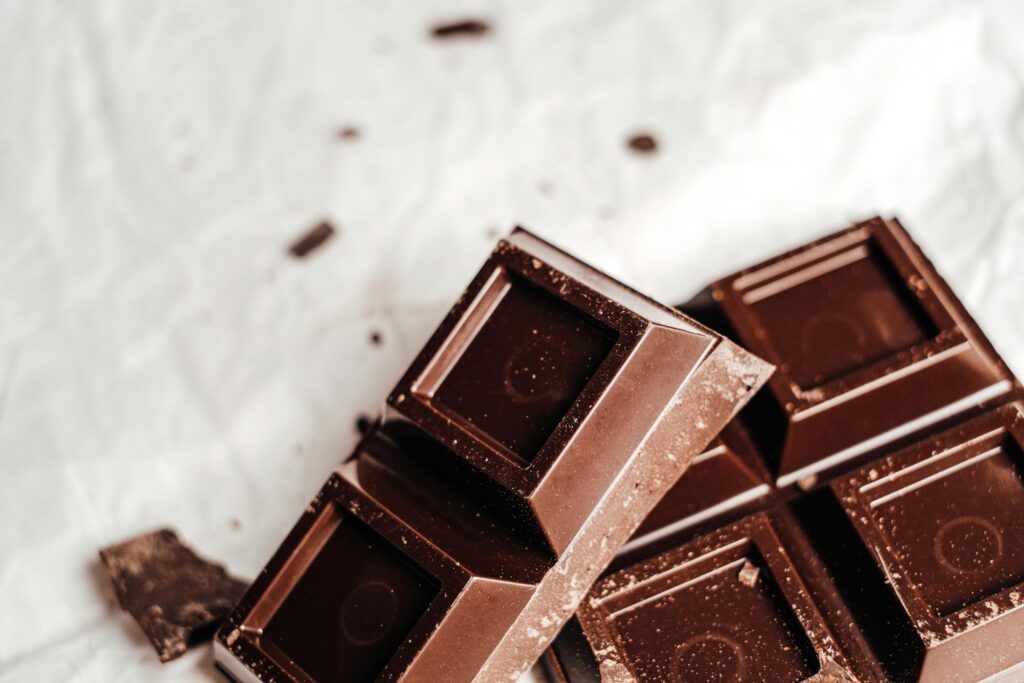Potential Benefits of Dark Chocolate.

Dark chocolate, especially varieties with a high cocoa content (70% or more), offers several health benefits due to its rich content of antioxidants, minerals, and healthy compounds like flavonoids. Here are some key health benefits:
1. Heart Health
- Improves Blood Flow: Dark chocolate contains flavonoids, particularly a type called flavonols, which help to stimulate the lining of the arteries to produce nitric oxide. This compound relaxes the arteries, improving blood flow and lowering blood pressure.
- Lowers Risk of Heart Disease: Some studies suggest that eating moderate amounts of dark chocolate may reduce the risk of cardiovascular diseases. The antioxidants in dark chocolate can lower LDL (“bad”) cholesterol levels and increase HDL (“good”) cholesterol, potentially reducing the risk of heart disease.
2. Rich in Antioxidants
Dark chocolate is loaded with powerful antioxidants like polyphenols, flavanols, and catechins. These compounds neutralize free radicals and help protect your body from oxidative stress, which can lead to chronic diseases and aging.
3. Brain Health and Cognitive Function
- Improves Brain Function: The flavonoids in dark chocolate can also improve brain function by increasing blood flow to the brain. This may enhance memory, cognitive function, and reaction times.
- May Protect Against Neurodegenerative Diseases: Some studies suggest that regular consumption of dark chocolate might help protect against diseases like Alzheimer’s and Parkinson’s, though more research is needed.
4. Mood Enhancement
- Dark chocolate can boost the production of endorphins, the body’s “feel-good” hormones. It also contains serotonin, a neurotransmitter that can improve mood, helping to reduce stress and symptoms of depression.
5. Blood Sugar Control
- In moderate amounts, dark chocolate may help to improve insulin sensitivity, which could lower the risk of type 2 diabetes. However, portion control is key, as chocolate can still be high in sugar if consumed excessively.
6. Skin Protection
- The flavonoids in dark chocolate can improve skin hydration, reduce skin roughness, and increase resistance to UV damage, potentially offering some protection against sun damage.
7. Mineral-Rich
- Dark chocolate is a good source of important minerals, including iron, magnesium, copper, and manganese, all of which are essential for various bodily functions, such as supporting your immune system and promoting bone health.
8. Anti-Inflammatory Effects
- The compounds in dark chocolate may have anti-inflammatory properties, which can help to reduce inflammation in the body, linked to many chronic diseases, including arthritis and cardiovascular conditions.
Recommended Serving Size
Even though dark chocolate is healthy, it is calorie-dense and can contain sugar, so moderation is important. A recommended portion is about 1-2 ounces (30-60 grams) per day.
Potential Benefits of Dark Chocolate for Sleep:

- Rich in Magnesium:
Dark chocolate contains magnesium, a mineral that plays a key role in regulating sleep. Magnesium helps to relax the muscles and calm the nervous system, promoting better sleep quality. - Serotonin Production:
Dark chocolate contains tryptophan, an amino acid that helps increase the production of serotonin, a neurotransmitter that regulates mood and relaxation. Serotonin can then be converted into melatonin, the hormone responsible for controlling sleep cycles. - Antioxidants and Flavonoids:
Dark chocolate is rich in flavonoids and antioxidants that can help reduce stress and anxiety, potentially leading to a more relaxed state and better sleep. - Mood Improvement:
Consuming small amounts of dark chocolate can improve mood by stimulating the release of endorphins, which may promote relaxation and make it easier to fall asleep.
Potential Downsides for Sleep:
- Caffeine Content:
Dark chocolate contains small amounts of caffeine, which can act as a stimulant. For some people, especially those sensitive to caffeine, this can interfere with falling asleep, particularly if consumed in the evening. - Theobromine:
Theobromine, another compound found in dark chocolate, can have a mild stimulating effect similar to caffeine. This might prevent some individuals from falling asleep easily or disrupt the sleep cycle.
Recommendations:
If you want to enjoy dark chocolate for its potential sleep benefits:
- Opt for a small amount (preferably 70% cocoa or higher).
- Consume it earlier in the evening, at least a few hours before bedtime.
- Be mindful of your sensitivity to caffeine or theobromine.
While dark chocolate can support sleep in certain ways, moderation is key.

Never forget a dark chocolate can be your best friend every night.




